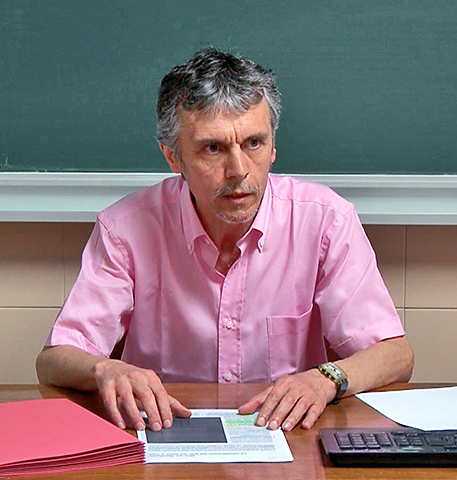
Xabier Vila-Coia (Coia, Vigo), has a degree in Political Science and Sociology from the Complutense University of Madrid (1989-1994), during which he was awarded the National Prize for Completion of University Studies. He completed his Doctoral courses in Social Anthropology (1994-1996), in the Programme La construcción de las identidades socioculturales (The construction of sociocultural identities). During the courses, and in the specific field of visual anthropology, he completed several works that would have an influence on his path to becoming a researcher and creator, which include Os medos (Fears) and Sobre la alegría: el carnaval de Porto Seguro [Bahia-Brazil] (About happiness: The Carnival in Porto Seguro). Subsequently, in the 1999-2000 academic year, he completed the Curso de Especialización en Derecho Constitucional y Ciencia Política (Specialisation Course on Constitutional Law and Political Science) at the «Centro de Estudios Políticos y Constitucionales» [CEPC ] (Political and Constitutional Study Centre of Madrid), which he concluded with a Final Research Paper entitled Biotecnología, bioética, nuevos derechos humanos y Constitución (Biotechnology, Bioethics, New Human Rights and the Constitution).
During the course of this training, he obtained a scholarship from the «Intercampus Interuniversity Cooperation Programme in Latin America» for undergraduate and postgraduate students, awarded by the Instituto de Cooperación Iberoamericana/Agencia Española de Cooperación Internacional para el Desarrollo (ICI/AECID) [Ibero-American Cooperation Institute and the Spanish Agency for International Development Cooperation], which he completed at the «Universidade Estadual Paulista» (São Paulo-Brazil); and a Research Staff Training Grant (FPI) from the Madrid Autonomous Community, which allowed him to do research at the Buenos Aires headquarters of the Facultad Latinoamericana de Ciencias Sociales [FLACSO-Argentina] (Latin American Faculty of Social Sciences» and at the «Universidad de La Habana» (Cuba) [University of Havana]. These stays abroad enriched his life and marked him significantly, both academically and professionally, and personally. In addition to the cities mentioned, Xabier Vila-Coia also lived, studied, worked and loved in Santiago de Compostela, A Estrada, Barcelona, Palma de Mallorca, Paris and Toulouse.
In order to complement his multidisciplinary training, during the 2015-2016 and 2016-2017 academic years he enrolled for the Master Universitario en Investigación en Arte y Creación [MIAC] (Master's Degree in Research in Art and Creation) at the Faculty of Fine Arts of the Complutense University and passed all the compulsory and optional subjects. He decided to postpone sine die the conclusion of the «Trabajo Final de Máster» [TFM] (Final Master's Project), and focus on his own publications and presentations, in addition to his studies and research.
As an author he has published experimental poetry books Galiza C i B: Herriak Sense Fronteiras (Free Galicia: Villages without Borders [2001]) and El Hombre Masa y la Mujer Panadera (The Mass-Man and the Baker Woman [2004]. Tthis title is a play on words because «Masa» is a polysemic word in Spanish that, among other meanings, can refer to dough, used to make bread); the essay Biotecnología. Bioética. Tanatoética. Tanatoestética. Nuevos Derechos Humanos y Constitución (Biotechnology. Bioethics. Tanato-Ethics. Tanato-Aesthetics. New Human Rights and the Constitution [2006]); the volume of photographs El Socialismo no es una utopía: es una ilusión (Socialism is no a Utopia: it is an Illusion [2006]), a work nominated by the general coordinator of the Festival Internacional de Fotografía y Artes Visuales PHotoEspaña (PHotoEspaña International Festival of Photography and Visual Arts) for the Premio Nacional de fotografía 2007 (National Photographic Prize 2007); the story Diario no velado de La Habana (Unveiled diary of Havana» [2008]. This title is a play on words between «no velado» [unveiled] and «novelado» [novelized] which are phonetically identical); the book of sentences 213 Aforistmos para el siglo veintiuno (213 Aphoristms for the twenty-first century [2010]) the work on Visual and Experimental Anthropology Os medos/Les pors/Los miedos /Fears [2015], independently edited in these four languages (Galician, Catalan, Spanish and English); the political graffiti photobook La ciudad universitaria de Madrid: memoria política histórica y reciente en el discurso mural (The university city of Madrid: historical political and recent memory in mural discourse [2017]); the microessay Pornografía. Hacia una ontología de la penetración (Pornography. Towards an Ontology of Penetration [2018]), and the visual and essayistic work Grafitis, carteles, pegatinas, stencils y collages en la Facultad de Ciencias Políticas y Sociología de la Universidad Complutense (1988-1989/2018-2019): del postfranquismo al metapodemismo (Graffiti, Posters, Stickers, Stencils and Collages at the Faculty of Political Science and Sociology of the Complutense University (1988-1989/ 2018-2019): from post-Francoism to Metapodemism [2019]). the picture book titled 15M décimo aniversario: 2011-2021 (15M Tenth Anniversary: 2011-2021 [May 2021]), the work of linguistic sociology, philosophy of language and photography COVID-19 [July 2021], and the volume of aphorisms illustrated with photography 80 Estados de WhatsApp (80 WhatsApp Updates [2025]).
His books and creations have been acquired and exhibited in institutions of international relevance, including the «Feria Internacional de Arte Contemporáneo de Madrid» [ARCO] (Madrid International Contemporary Art Fair), the «Museu d'Art Contemporani de Barcelona» [MACBA] (Museum of Contemporary Art of Barcelona), the «Museo Nacional Centro de Arte Reina Sofía» (Reina Sofía National Art Centre Museum), the Library of Congress, the British Library, the «Bibliothèque Nationale de France», the National Library of China, the Peace Palace Library (The Hague), the «Internationaal Instituut voor Sociale Geschiedenis» (Amsterdam), the «Ibero-Amerikanisches Institut» (Berlin), the «Institut des hautes études de l'Amérique latine» (Paris), and Harvard, Princeton and Stanford universities, among others.
He currently lives in Madrid, where he develops his intellectual and creative activity, which he combines with his studies of philosophy.
